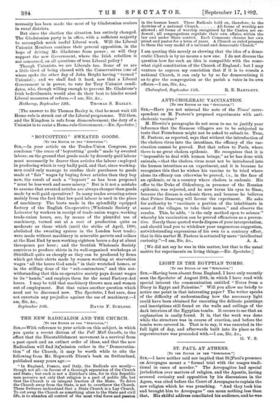"BOYCOTTING" SWEATED GOODS.
rTo THE EDITOR OF THE " SPECTATOR.”1 SIR,—In your article on the Trades-Union Congress, you condemn "the craze of ' boycotting ' goods" made by sweated labour, on the ground that goods made by decently-paid labour must necessarily be dearer than articles the labour employed in producing which is very badly paid, and that, since working- men could only manage to confine their purchases to goods made at " fair " wages by buying fewer articles than they buy now, the result of such a " boycott " as has been proposed "must be less work and more misery." But is it not a mistake to assume that sweated articles are always cheaper than goods made by well-paid operatives ? In many trades sweating arises mainly from the fact that low-paid labour is used in the place of machinery. The boots made in the splendidly equipped factory of the English Co-operative tWholeeale Society at Leicester by workers in receipt of trade-union wages, working trade-union hours, are, by means of the plentiful use of machinery, turned out at a cost of production quite as moderate as those which (until the strike of April, 1890, abolished the sweating system in the London boot trade), were made without machinery in miserable garrets and cellars at the East End by men working eighteen hours a day at about threepence per hour; and the Scottish Wholesale Society contrives to produce shirts in its well-organised workshops at Shieldhall quite as cheaply as they can be produced by firms which get their shirts made by women working at starvation wages "all the hours God sends" in their wretched homes, or in the stifling dens of the "sub-contractors," and this not- withstanding that this co-operative society pays decent wages to its "hands," and employs them for the usual Factory-Act hours. I may be told that machinery throws men and women out of employment. But that raises another question which need not be discussed now. The Spectator, I feel sure, does not entertain any prejudice against the use of machinery.—I am, Sir, &c.,


































 Previous page
Previous page